Holmes Institute HI6008: Research Proposal on Social Entrepreneurship
VerifiedAdded on 2022/09/18
|10
|1826
|30
Report
AI Summary
This research report is a proposal exploring the opportunities and challenges of social entrepreneurship in Australia. It begins with an executive summary highlighting the lack of opportunities for social entrepreneurs in the country. The report employs positivism as a research philosophy and quantitative methods for data collection, focusing on top Australian social entrepreneurs. It includes a literature review defining social entrepreneurship and its context in Australia, followed by the research methodology, data collection, and analysis sections. The report also outlines expected findings, potential limitations, and provides conclusions and recommendations for fostering sustainable growth in the sector. The study aims to identify challenges such as legislative issues, funding access, and lack of specialized employee competencies, while also recognizing opportunities like waste management and green infrastructure. The study concludes with recommendations for further research, including the use of qualitative methods and the development of action plans for social enterprises.

Running Head: RESEARCH PROPOSAL
Research Proposal
Name of the Student
Name of the University
Author Note
Research Proposal
Name of the Student
Name of the University
Author Note
Paraphrase This Document
Need a fresh take? Get an instant paraphrase of this document with our AI Paraphraser
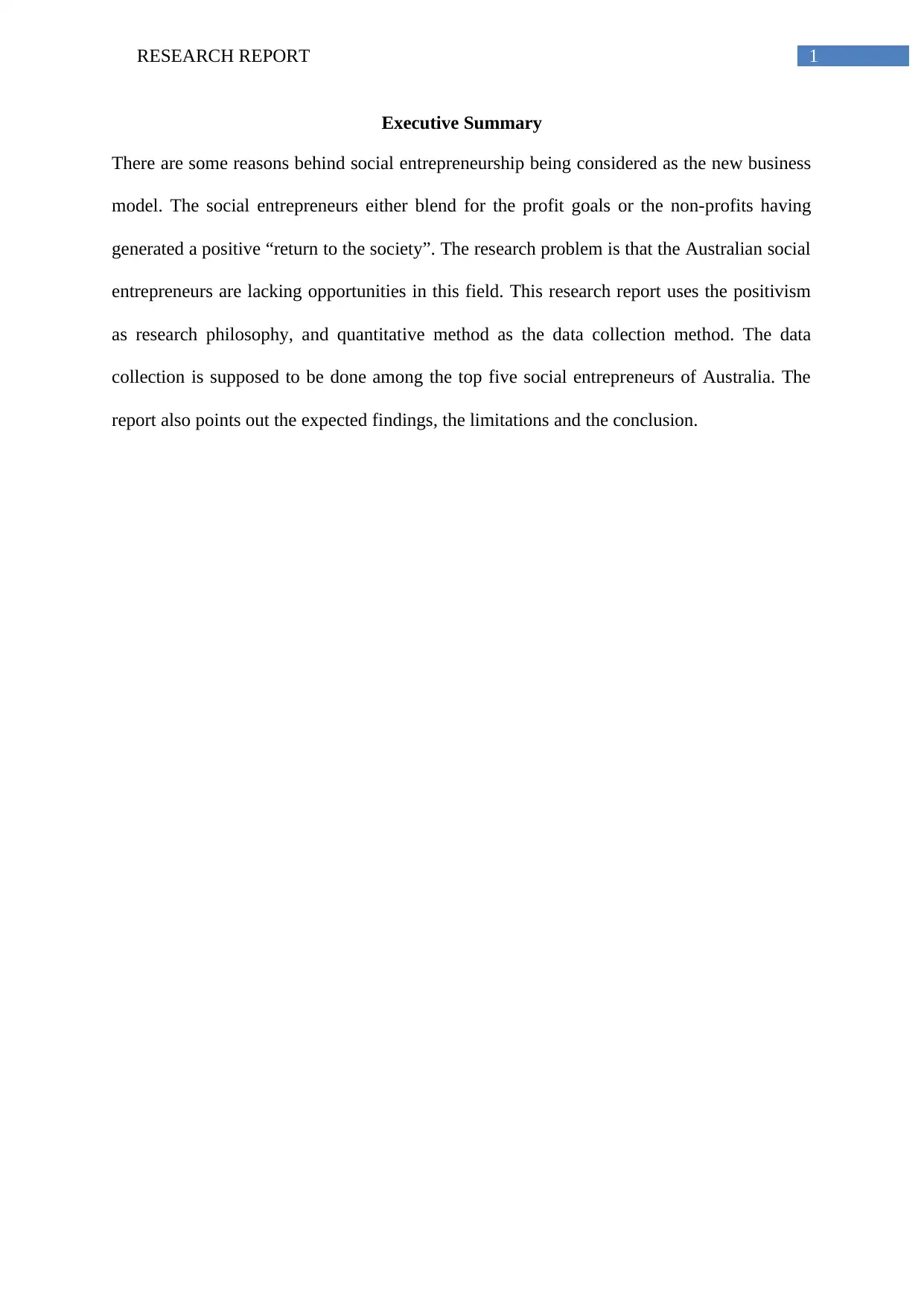
1RESEARCH REPORT
Executive Summary
There are some reasons behind social entrepreneurship being considered as the new business
model. The social entrepreneurs either blend for the profit goals or the non-profits having
generated a positive “return to the society”. The research problem is that the Australian social
entrepreneurs are lacking opportunities in this field. This research report uses the positivism
as research philosophy, and quantitative method as the data collection method. The data
collection is supposed to be done among the top five social entrepreneurs of Australia. The
report also points out the expected findings, the limitations and the conclusion.
Executive Summary
There are some reasons behind social entrepreneurship being considered as the new business
model. The social entrepreneurs either blend for the profit goals or the non-profits having
generated a positive “return to the society”. The research problem is that the Australian social
entrepreneurs are lacking opportunities in this field. This research report uses the positivism
as research philosophy, and quantitative method as the data collection method. The data
collection is supposed to be done among the top five social entrepreneurs of Australia. The
report also points out the expected findings, the limitations and the conclusion.
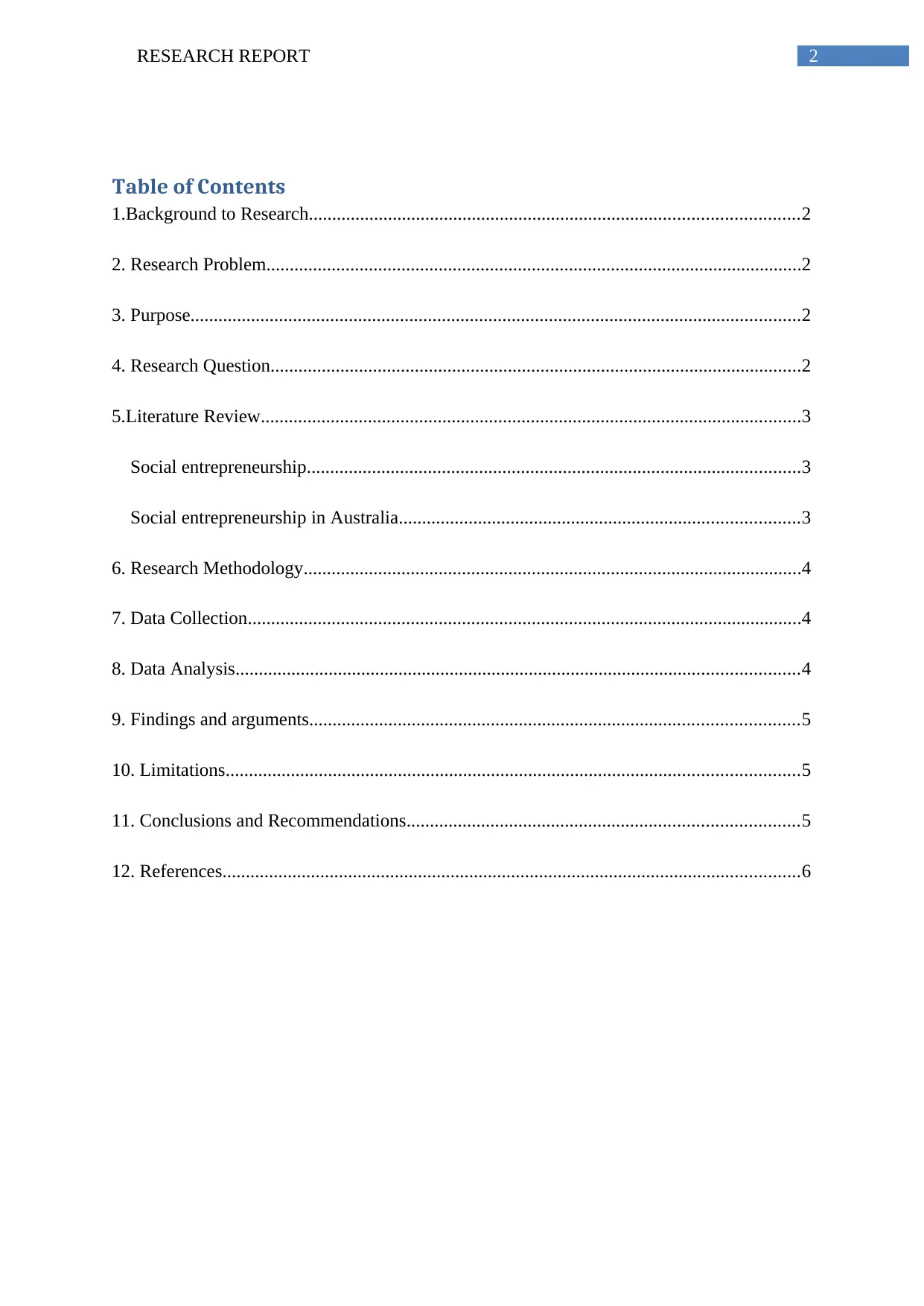
2RESEARCH REPORT
Table of Contents
1.Background to Research.........................................................................................................2
2. Research Problem...................................................................................................................2
3. Purpose...................................................................................................................................2
4. Research Question..................................................................................................................2
5.Literature Review....................................................................................................................3
Social entrepreneurship..........................................................................................................3
Social entrepreneurship in Australia......................................................................................3
6. Research Methodology...........................................................................................................4
7. Data Collection.......................................................................................................................4
8. Data Analysis.........................................................................................................................4
9. Findings and arguments.........................................................................................................5
10. Limitations...........................................................................................................................5
11. Conclusions and Recommendations....................................................................................5
12. References............................................................................................................................6
Table of Contents
1.Background to Research.........................................................................................................2
2. Research Problem...................................................................................................................2
3. Purpose...................................................................................................................................2
4. Research Question..................................................................................................................2
5.Literature Review....................................................................................................................3
Social entrepreneurship..........................................................................................................3
Social entrepreneurship in Australia......................................................................................3
6. Research Methodology...........................................................................................................4
7. Data Collection.......................................................................................................................4
8. Data Analysis.........................................................................................................................4
9. Findings and arguments.........................................................................................................5
10. Limitations...........................................................................................................................5
11. Conclusions and Recommendations....................................................................................5
12. References............................................................................................................................6
⊘ This is a preview!⊘
Do you want full access?
Subscribe today to unlock all pages.

Trusted by 1+ million students worldwide
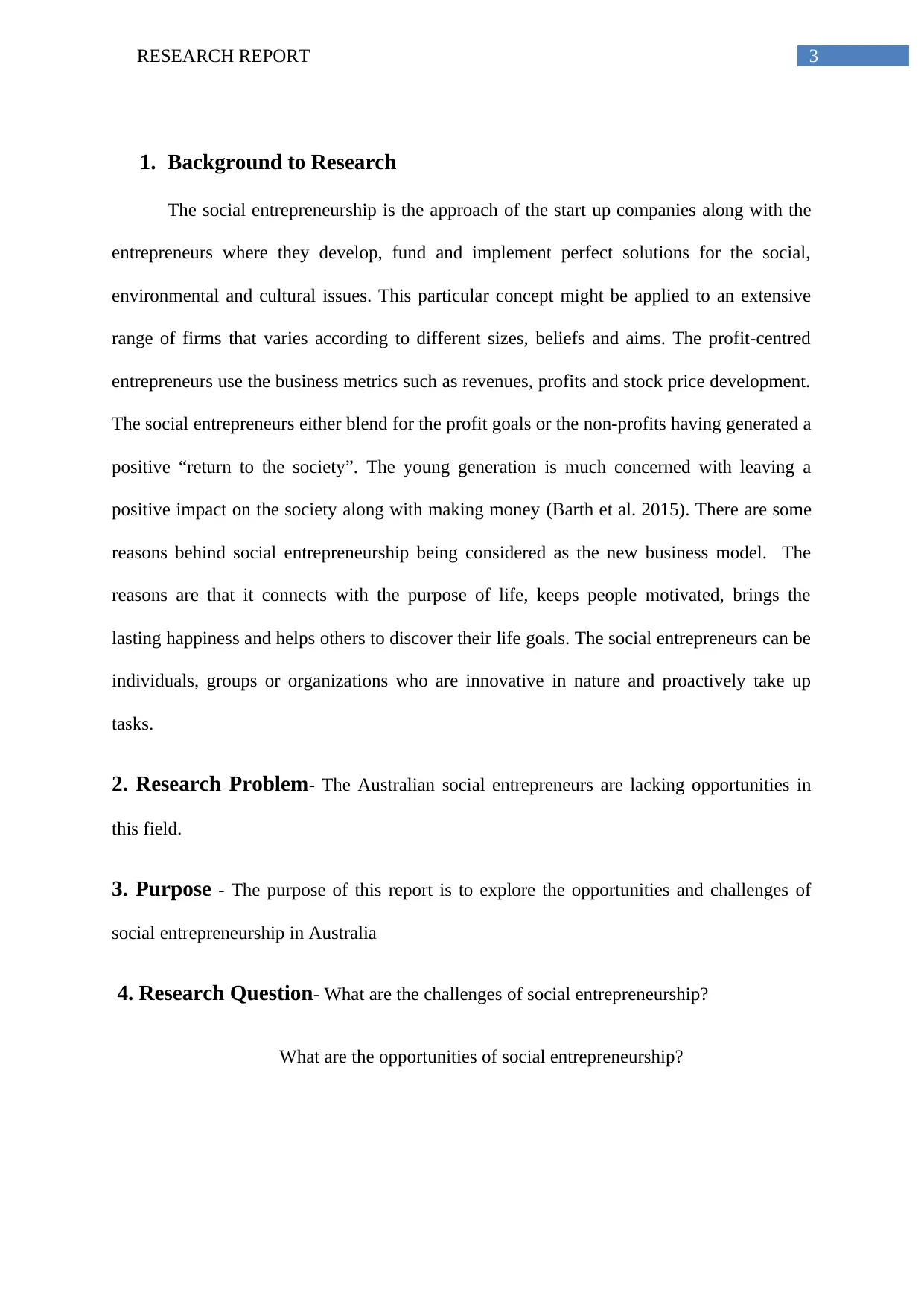
3RESEARCH REPORT
1. Background to Research
The social entrepreneurship is the approach of the start up companies along with the
entrepreneurs where they develop, fund and implement perfect solutions for the social,
environmental and cultural issues. This particular concept might be applied to an extensive
range of firms that varies according to different sizes, beliefs and aims. The profit-centred
entrepreneurs use the business metrics such as revenues, profits and stock price development.
The social entrepreneurs either blend for the profit goals or the non-profits having generated a
positive “return to the society”. The young generation is much concerned with leaving a
positive impact on the society along with making money (Barth et al. 2015). There are some
reasons behind social entrepreneurship being considered as the new business model. The
reasons are that it connects with the purpose of life, keeps people motivated, brings the
lasting happiness and helps others to discover their life goals. The social entrepreneurs can be
individuals, groups or organizations who are innovative in nature and proactively take up
tasks.
2. Research Problem- The Australian social entrepreneurs are lacking opportunities in
this field.
3. Purpose - The purpose of this report is to explore the opportunities and challenges of
social entrepreneurship in Australia
4. Research Question- What are the challenges of social entrepreneurship?
What are the opportunities of social entrepreneurship?
1. Background to Research
The social entrepreneurship is the approach of the start up companies along with the
entrepreneurs where they develop, fund and implement perfect solutions for the social,
environmental and cultural issues. This particular concept might be applied to an extensive
range of firms that varies according to different sizes, beliefs and aims. The profit-centred
entrepreneurs use the business metrics such as revenues, profits and stock price development.
The social entrepreneurs either blend for the profit goals or the non-profits having generated a
positive “return to the society”. The young generation is much concerned with leaving a
positive impact on the society along with making money (Barth et al. 2015). There are some
reasons behind social entrepreneurship being considered as the new business model. The
reasons are that it connects with the purpose of life, keeps people motivated, brings the
lasting happiness and helps others to discover their life goals. The social entrepreneurs can be
individuals, groups or organizations who are innovative in nature and proactively take up
tasks.
2. Research Problem- The Australian social entrepreneurs are lacking opportunities in
this field.
3. Purpose - The purpose of this report is to explore the opportunities and challenges of
social entrepreneurship in Australia
4. Research Question- What are the challenges of social entrepreneurship?
What are the opportunities of social entrepreneurship?
Paraphrase This Document
Need a fresh take? Get an instant paraphrase of this document with our AI Paraphraser
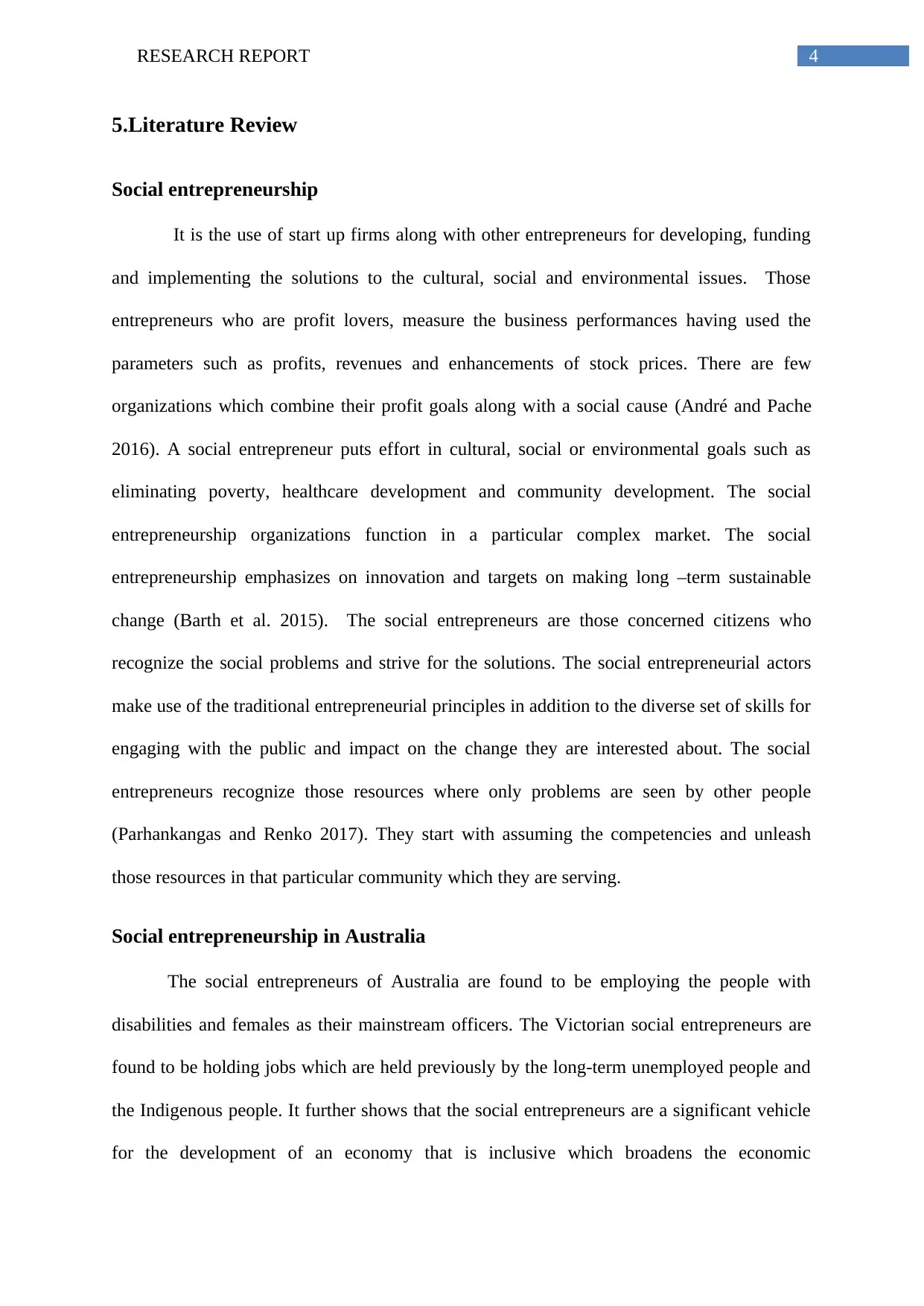
4RESEARCH REPORT
5.Literature Review
Social entrepreneurship
It is the use of start up firms along with other entrepreneurs for developing, funding
and implementing the solutions to the cultural, social and environmental issues. Those
entrepreneurs who are profit lovers, measure the business performances having used the
parameters such as profits, revenues and enhancements of stock prices. There are few
organizations which combine their profit goals along with a social cause (André and Pache
2016). A social entrepreneur puts effort in cultural, social or environmental goals such as
eliminating poverty, healthcare development and community development. The social
entrepreneurship organizations function in a particular complex market. The social
entrepreneurship emphasizes on innovation and targets on making long –term sustainable
change (Barth et al. 2015). The social entrepreneurs are those concerned citizens who
recognize the social problems and strive for the solutions. The social entrepreneurial actors
make use of the traditional entrepreneurial principles in addition to the diverse set of skills for
engaging with the public and impact on the change they are interested about. The social
entrepreneurs recognize those resources where only problems are seen by other people
(Parhankangas and Renko 2017). They start with assuming the competencies and unleash
those resources in that particular community which they are serving.
Social entrepreneurship in Australia
The social entrepreneurs of Australia are found to be employing the people with
disabilities and females as their mainstream officers. The Victorian social entrepreneurs are
found to be holding jobs which are held previously by the long-term unemployed people and
the Indigenous people. It further shows that the social entrepreneurs are a significant vehicle
for the development of an economy that is inclusive which broadens the economic
5.Literature Review
Social entrepreneurship
It is the use of start up firms along with other entrepreneurs for developing, funding
and implementing the solutions to the cultural, social and environmental issues. Those
entrepreneurs who are profit lovers, measure the business performances having used the
parameters such as profits, revenues and enhancements of stock prices. There are few
organizations which combine their profit goals along with a social cause (André and Pache
2016). A social entrepreneur puts effort in cultural, social or environmental goals such as
eliminating poverty, healthcare development and community development. The social
entrepreneurship organizations function in a particular complex market. The social
entrepreneurship emphasizes on innovation and targets on making long –term sustainable
change (Barth et al. 2015). The social entrepreneurs are those concerned citizens who
recognize the social problems and strive for the solutions. The social entrepreneurial actors
make use of the traditional entrepreneurial principles in addition to the diverse set of skills for
engaging with the public and impact on the change they are interested about. The social
entrepreneurs recognize those resources where only problems are seen by other people
(Parhankangas and Renko 2017). They start with assuming the competencies and unleash
those resources in that particular community which they are serving.
Social entrepreneurship in Australia
The social entrepreneurs of Australia are found to be employing the people with
disabilities and females as their mainstream officers. The Victorian social entrepreneurs are
found to be holding jobs which are held previously by the long-term unemployed people and
the Indigenous people. It further shows that the social entrepreneurs are a significant vehicle
for the development of an economy that is inclusive which broadens the economic
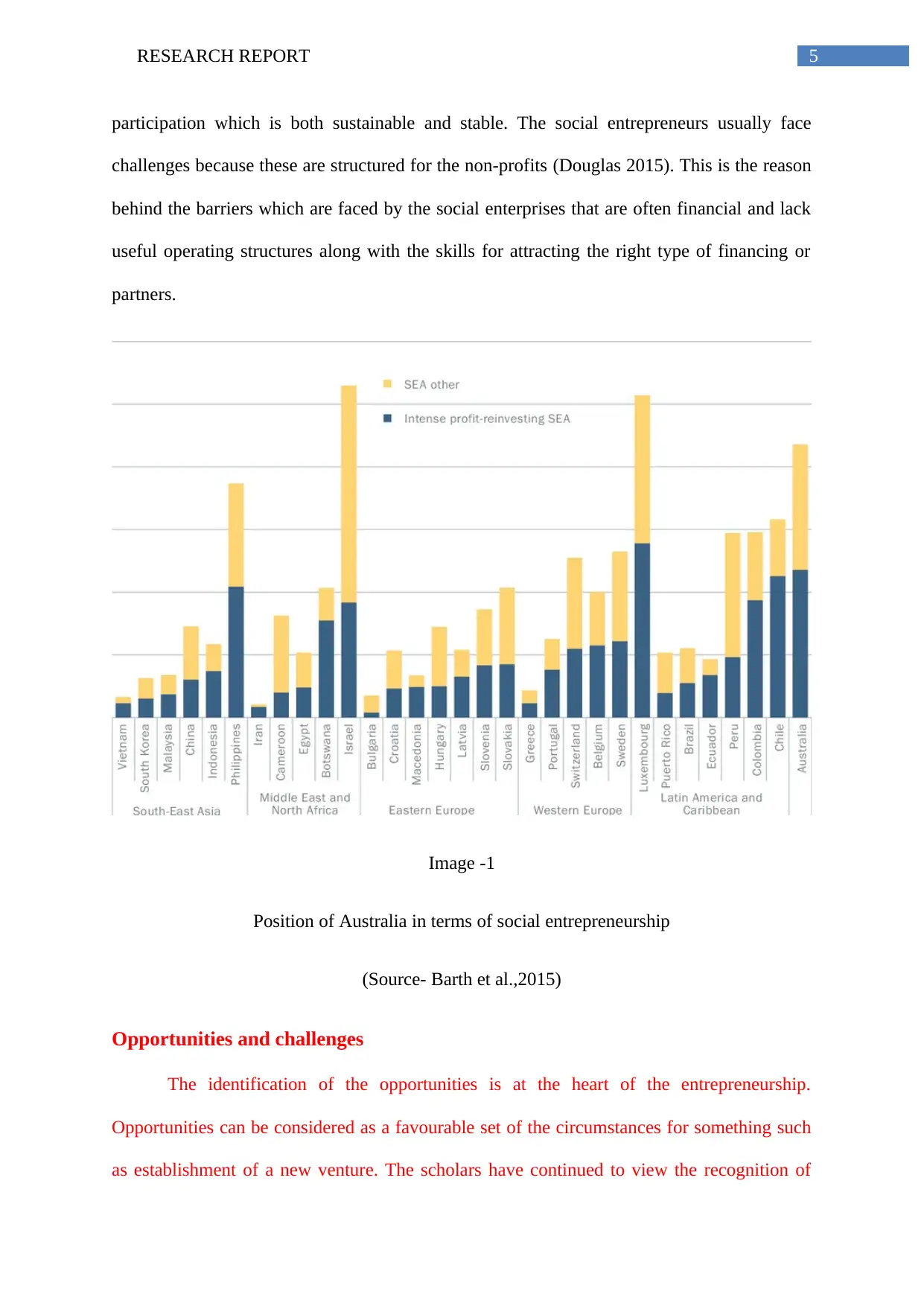
5RESEARCH REPORT
participation which is both sustainable and stable. The social entrepreneurs usually face
challenges because these are structured for the non-profits (Douglas 2015). This is the reason
behind the barriers which are faced by the social enterprises that are often financial and lack
useful operating structures along with the skills for attracting the right type of financing or
partners.
Image -1
Position of Australia in terms of social entrepreneurship
(Source- Barth et al.,2015)
Opportunities and challenges
The identification of the opportunities is at the heart of the entrepreneurship.
Opportunities can be considered as a favourable set of the circumstances for something such
as establishment of a new venture. The scholars have continued to view the recognition of
participation which is both sustainable and stable. The social entrepreneurs usually face
challenges because these are structured for the non-profits (Douglas 2015). This is the reason
behind the barriers which are faced by the social enterprises that are often financial and lack
useful operating structures along with the skills for attracting the right type of financing or
partners.
Image -1
Position of Australia in terms of social entrepreneurship
(Source- Barth et al.,2015)
Opportunities and challenges
The identification of the opportunities is at the heart of the entrepreneurship.
Opportunities can be considered as a favourable set of the circumstances for something such
as establishment of a new venture. The scholars have continued to view the recognition of
⊘ This is a preview!⊘
Do you want full access?
Subscribe today to unlock all pages.

Trusted by 1+ million students worldwide
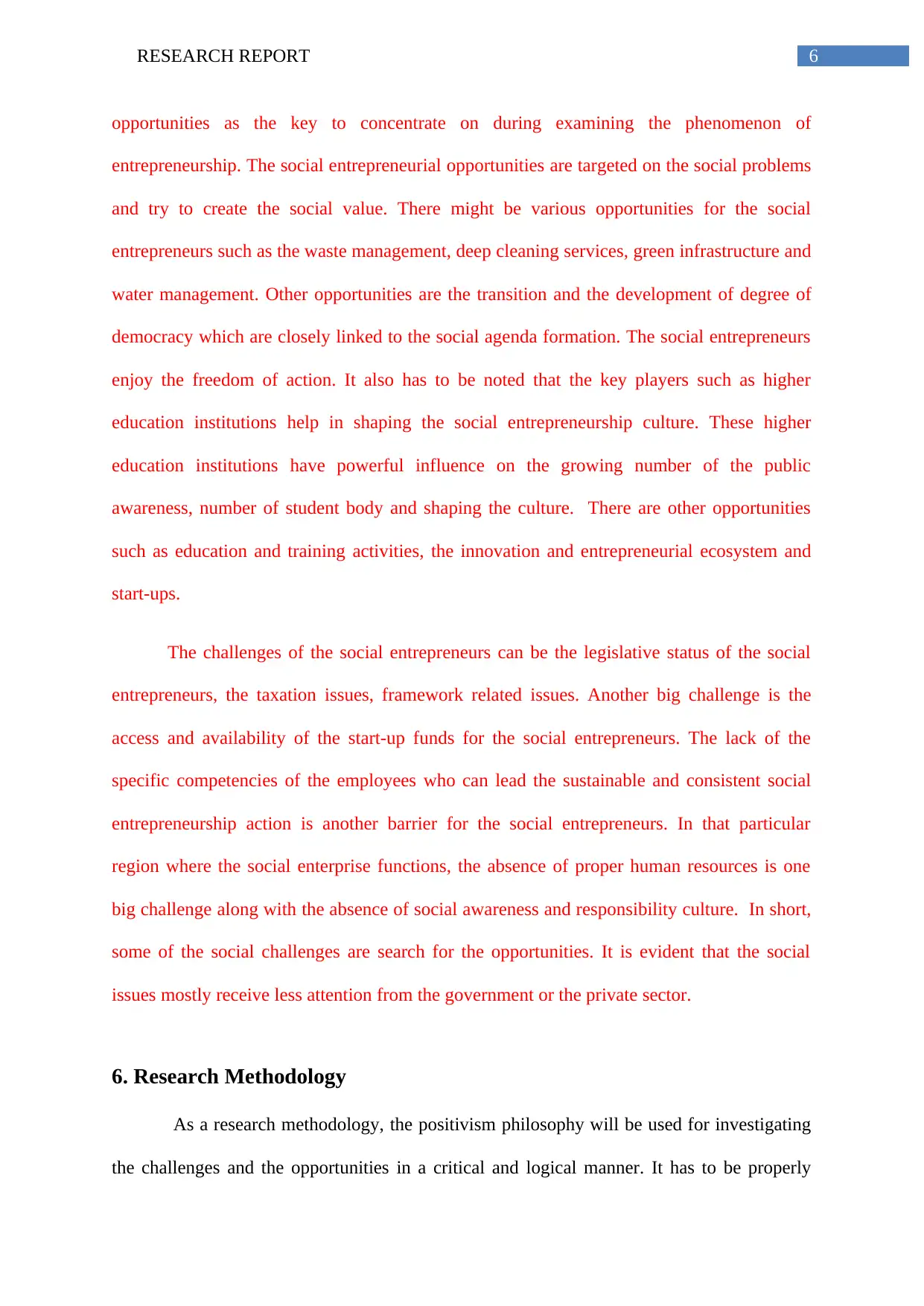
6RESEARCH REPORT
opportunities as the key to concentrate on during examining the phenomenon of
entrepreneurship. The social entrepreneurial opportunities are targeted on the social problems
and try to create the social value. There might be various opportunities for the social
entrepreneurs such as the waste management, deep cleaning services, green infrastructure and
water management. Other opportunities are the transition and the development of degree of
democracy which are closely linked to the social agenda formation. The social entrepreneurs
enjoy the freedom of action. It also has to be noted that the key players such as higher
education institutions help in shaping the social entrepreneurship culture. These higher
education institutions have powerful influence on the growing number of the public
awareness, number of student body and shaping the culture. There are other opportunities
such as education and training activities, the innovation and entrepreneurial ecosystem and
start-ups.
The challenges of the social entrepreneurs can be the legislative status of the social
entrepreneurs, the taxation issues, framework related issues. Another big challenge is the
access and availability of the start-up funds for the social entrepreneurs. The lack of the
specific competencies of the employees who can lead the sustainable and consistent social
entrepreneurship action is another barrier for the social entrepreneurs. In that particular
region where the social enterprise functions, the absence of proper human resources is one
big challenge along with the absence of social awareness and responsibility culture. In short,
some of the social challenges are search for the opportunities. It is evident that the social
issues mostly receive less attention from the government or the private sector.
6. Research Methodology
As a research methodology, the positivism philosophy will be used for investigating
the challenges and the opportunities in a critical and logical manner. It has to be properly
opportunities as the key to concentrate on during examining the phenomenon of
entrepreneurship. The social entrepreneurial opportunities are targeted on the social problems
and try to create the social value. There might be various opportunities for the social
entrepreneurs such as the waste management, deep cleaning services, green infrastructure and
water management. Other opportunities are the transition and the development of degree of
democracy which are closely linked to the social agenda formation. The social entrepreneurs
enjoy the freedom of action. It also has to be noted that the key players such as higher
education institutions help in shaping the social entrepreneurship culture. These higher
education institutions have powerful influence on the growing number of the public
awareness, number of student body and shaping the culture. There are other opportunities
such as education and training activities, the innovation and entrepreneurial ecosystem and
start-ups.
The challenges of the social entrepreneurs can be the legislative status of the social
entrepreneurs, the taxation issues, framework related issues. Another big challenge is the
access and availability of the start-up funds for the social entrepreneurs. The lack of the
specific competencies of the employees who can lead the sustainable and consistent social
entrepreneurship action is another barrier for the social entrepreneurs. In that particular
region where the social enterprise functions, the absence of proper human resources is one
big challenge along with the absence of social awareness and responsibility culture. In short,
some of the social challenges are search for the opportunities. It is evident that the social
issues mostly receive less attention from the government or the private sector.
6. Research Methodology
As a research methodology, the positivism philosophy will be used for investigating
the challenges and the opportunities in a critical and logical manner. It has to be properly
Paraphrase This Document
Need a fresh take? Get an instant paraphrase of this document with our AI Paraphraser
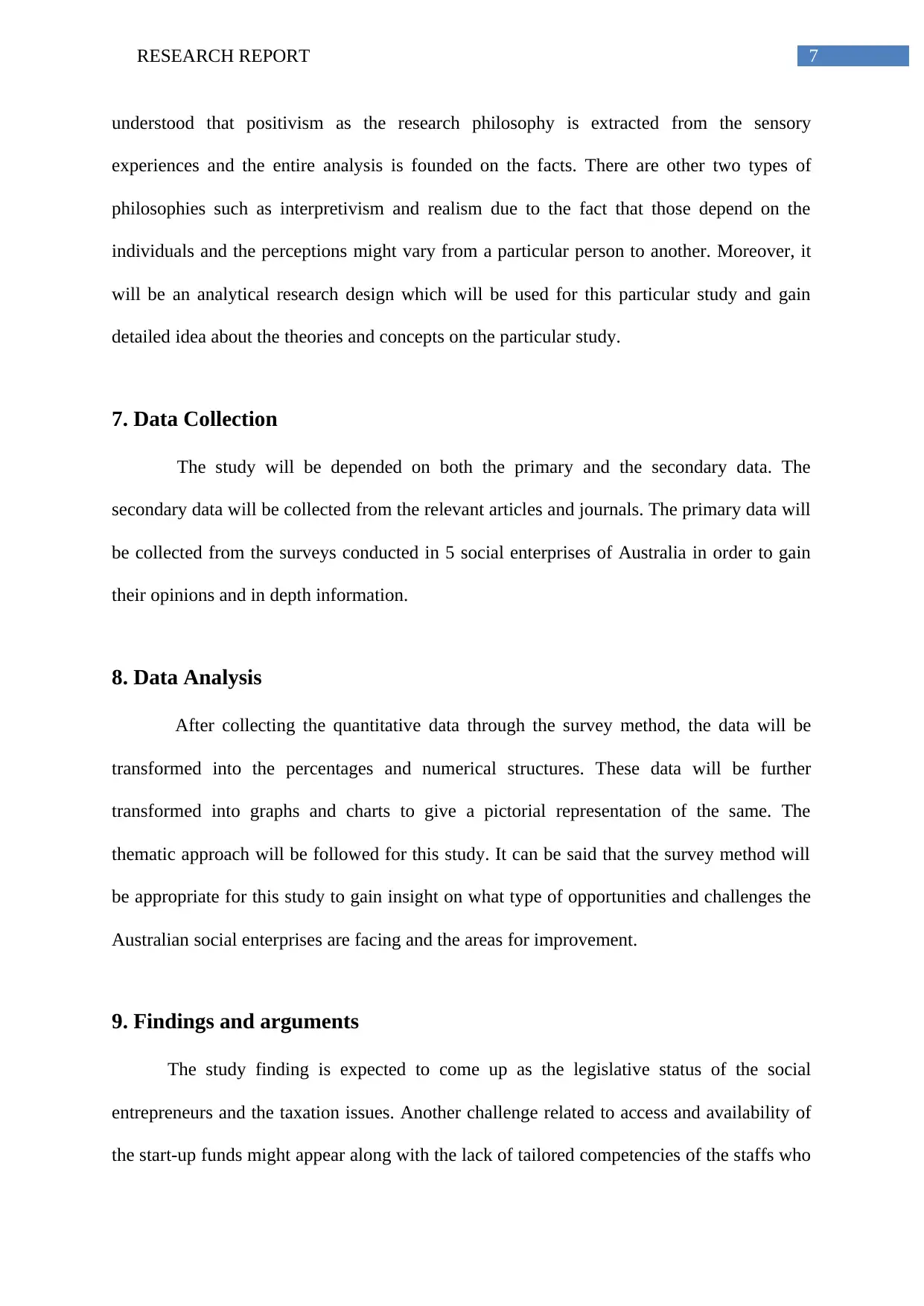
7RESEARCH REPORT
understood that positivism as the research philosophy is extracted from the sensory
experiences and the entire analysis is founded on the facts. There are other two types of
philosophies such as interpretivism and realism due to the fact that those depend on the
individuals and the perceptions might vary from a particular person to another. Moreover, it
will be an analytical research design which will be used for this particular study and gain
detailed idea about the theories and concepts on the particular study.
7. Data Collection
The study will be depended on both the primary and the secondary data. The
secondary data will be collected from the relevant articles and journals. The primary data will
be collected from the surveys conducted in 5 social enterprises of Australia in order to gain
their opinions and in depth information.
8. Data Analysis
After collecting the quantitative data through the survey method, the data will be
transformed into the percentages and numerical structures. These data will be further
transformed into graphs and charts to give a pictorial representation of the same. The
thematic approach will be followed for this study. It can be said that the survey method will
be appropriate for this study to gain insight on what type of opportunities and challenges the
Australian social enterprises are facing and the areas for improvement.
9. Findings and arguments
The study finding is expected to come up as the legislative status of the social
entrepreneurs and the taxation issues. Another challenge related to access and availability of
the start-up funds might appear along with the lack of tailored competencies of the staffs who
understood that positivism as the research philosophy is extracted from the sensory
experiences and the entire analysis is founded on the facts. There are other two types of
philosophies such as interpretivism and realism due to the fact that those depend on the
individuals and the perceptions might vary from a particular person to another. Moreover, it
will be an analytical research design which will be used for this particular study and gain
detailed idea about the theories and concepts on the particular study.
7. Data Collection
The study will be depended on both the primary and the secondary data. The
secondary data will be collected from the relevant articles and journals. The primary data will
be collected from the surveys conducted in 5 social enterprises of Australia in order to gain
their opinions and in depth information.
8. Data Analysis
After collecting the quantitative data through the survey method, the data will be
transformed into the percentages and numerical structures. These data will be further
transformed into graphs and charts to give a pictorial representation of the same. The
thematic approach will be followed for this study. It can be said that the survey method will
be appropriate for this study to gain insight on what type of opportunities and challenges the
Australian social enterprises are facing and the areas for improvement.
9. Findings and arguments
The study finding is expected to come up as the legislative status of the social
entrepreneurs and the taxation issues. Another challenge related to access and availability of
the start-up funds might appear along with the lack of tailored competencies of the staffs who
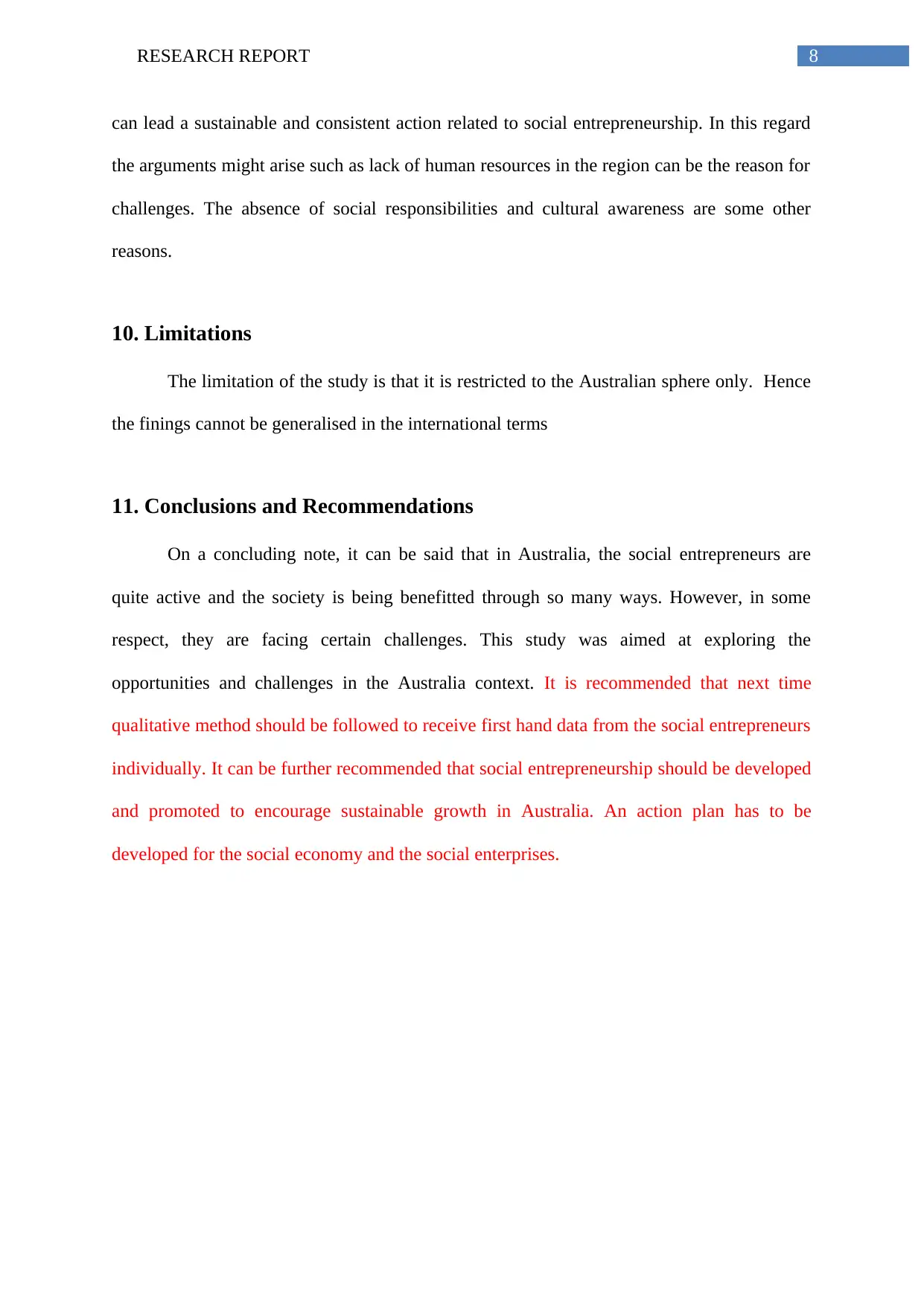
8RESEARCH REPORT
can lead a sustainable and consistent action related to social entrepreneurship. In this regard
the arguments might arise such as lack of human resources in the region can be the reason for
challenges. The absence of social responsibilities and cultural awareness are some other
reasons.
10. Limitations
The limitation of the study is that it is restricted to the Australian sphere only. Hence
the finings cannot be generalised in the international terms
11. Conclusions and Recommendations
On a concluding note, it can be said that in Australia, the social entrepreneurs are
quite active and the society is being benefitted through so many ways. However, in some
respect, they are facing certain challenges. This study was aimed at exploring the
opportunities and challenges in the Australia context. It is recommended that next time
qualitative method should be followed to receive first hand data from the social entrepreneurs
individually. It can be further recommended that social entrepreneurship should be developed
and promoted to encourage sustainable growth in Australia. An action plan has to be
developed for the social economy and the social enterprises.
can lead a sustainable and consistent action related to social entrepreneurship. In this regard
the arguments might arise such as lack of human resources in the region can be the reason for
challenges. The absence of social responsibilities and cultural awareness are some other
reasons.
10. Limitations
The limitation of the study is that it is restricted to the Australian sphere only. Hence
the finings cannot be generalised in the international terms
11. Conclusions and Recommendations
On a concluding note, it can be said that in Australia, the social entrepreneurs are
quite active and the society is being benefitted through so many ways. However, in some
respect, they are facing certain challenges. This study was aimed at exploring the
opportunities and challenges in the Australia context. It is recommended that next time
qualitative method should be followed to receive first hand data from the social entrepreneurs
individually. It can be further recommended that social entrepreneurship should be developed
and promoted to encourage sustainable growth in Australia. An action plan has to be
developed for the social economy and the social enterprises.
⊘ This is a preview!⊘
Do you want full access?
Subscribe today to unlock all pages.

Trusted by 1+ million students worldwide
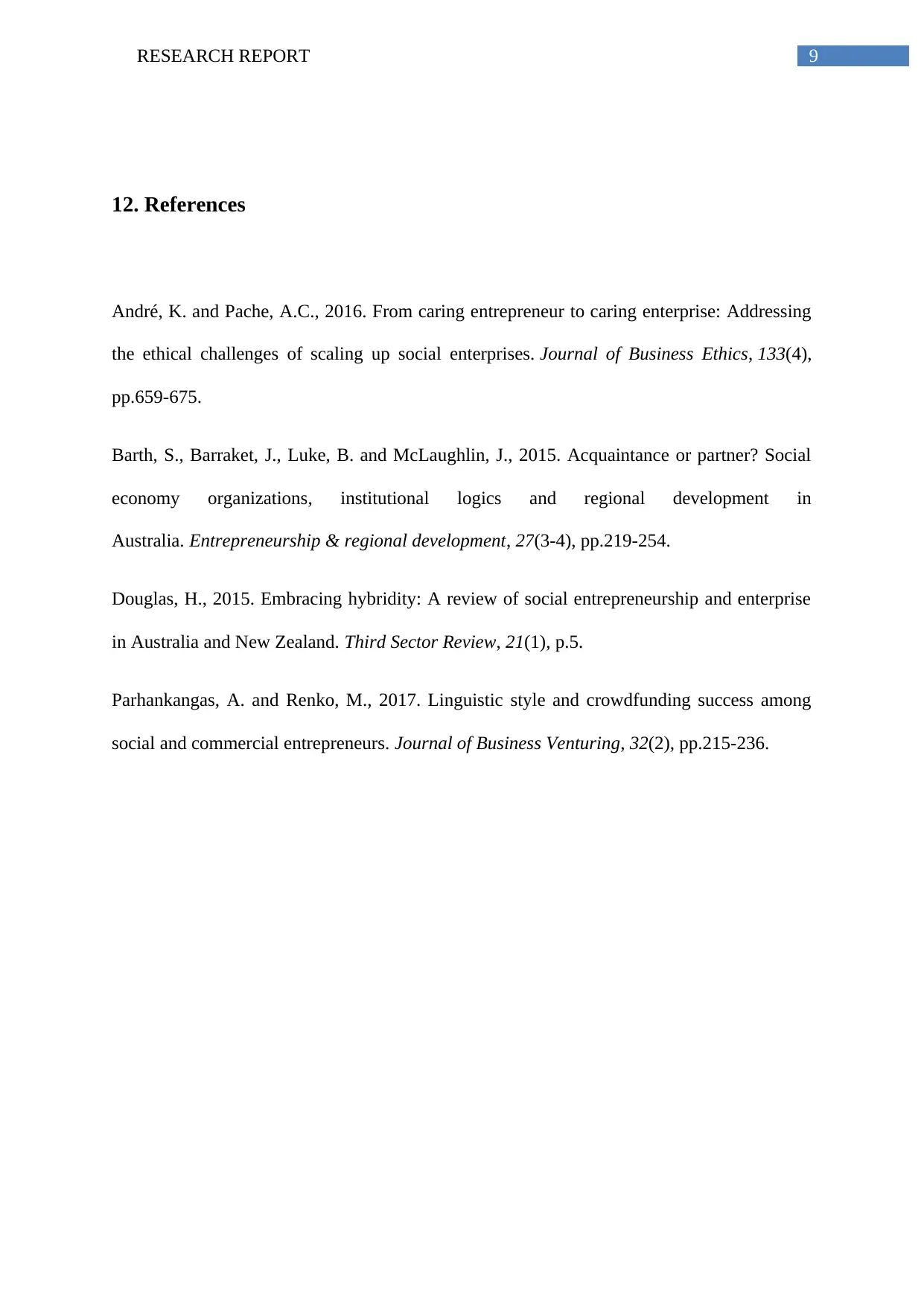
9RESEARCH REPORT
12. References
André, K. and Pache, A.C., 2016. From caring entrepreneur to caring enterprise: Addressing
the ethical challenges of scaling up social enterprises. Journal of Business Ethics, 133(4),
pp.659-675.
Barth, S., Barraket, J., Luke, B. and McLaughlin, J., 2015. Acquaintance or partner? Social
economy organizations, institutional logics and regional development in
Australia. Entrepreneurship & regional development, 27(3-4), pp.219-254.
Douglas, H., 2015. Embracing hybridity: A review of social entrepreneurship and enterprise
in Australia and New Zealand. Third Sector Review, 21(1), p.5.
Parhankangas, A. and Renko, M., 2017. Linguistic style and crowdfunding success among
social and commercial entrepreneurs. Journal of Business Venturing, 32(2), pp.215-236.
12. References
André, K. and Pache, A.C., 2016. From caring entrepreneur to caring enterprise: Addressing
the ethical challenges of scaling up social enterprises. Journal of Business Ethics, 133(4),
pp.659-675.
Barth, S., Barraket, J., Luke, B. and McLaughlin, J., 2015. Acquaintance or partner? Social
economy organizations, institutional logics and regional development in
Australia. Entrepreneurship & regional development, 27(3-4), pp.219-254.
Douglas, H., 2015. Embracing hybridity: A review of social entrepreneurship and enterprise
in Australia and New Zealand. Third Sector Review, 21(1), p.5.
Parhankangas, A. and Renko, M., 2017. Linguistic style and crowdfunding success among
social and commercial entrepreneurs. Journal of Business Venturing, 32(2), pp.215-236.
1 out of 10
Related Documents
Your All-in-One AI-Powered Toolkit for Academic Success.
+13062052269
info@desklib.com
Available 24*7 on WhatsApp / Email
![[object Object]](/_next/static/media/star-bottom.7253800d.svg)
Unlock your academic potential
Copyright © 2020–2026 A2Z Services. All Rights Reserved. Developed and managed by ZUCOL.





